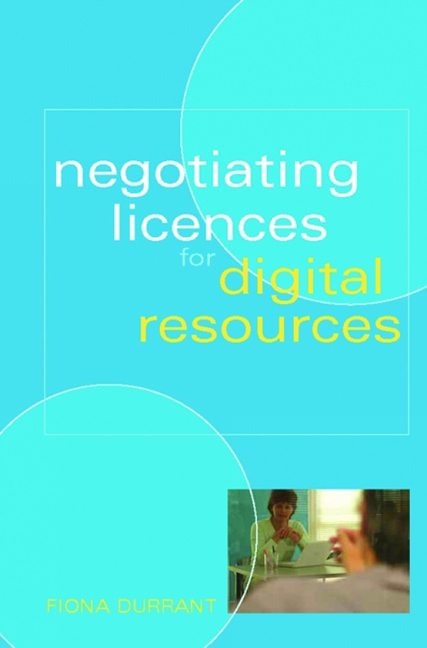Book contents
- Frontmatter
- Contents
- Acknowledgements
- Introduction
- 1 Preparation
- 2 The contract
- 3 Negotiation
- 4 Staff development and communicating negotiation outcome
- 5 Conclusion
- References and further reading
- Appendix 1 Frequently asked questions
- Appendix 2 Negotiation timeline
- Appendix 3 Personal negotiation experience
- Index
4 - Staff development and communicating negotiation outcome
Published online by Cambridge University Press: 08 June 2018
- Frontmatter
- Contents
- Acknowledgements
- Introduction
- 1 Preparation
- 2 The contract
- 3 Negotiation
- 4 Staff development and communicating negotiation outcome
- 5 Conclusion
- References and further reading
- Appendix 1 Frequently asked questions
- Appendix 2 Negotiation timeline
- Appendix 3 Personal negotiation experience
- Index
Summary
This chapter is more relevant to the larger organization than to the sole trader or small organization. It aims to show how negotiation can play a key role in the continuing professional development of staff and ensure that the negotiator keeps a high profile within the firm. It also covers what to do once the negotiation has finished, who to keep informed and what information to record.
Staff development
As we have seen in previous chapters there are many skills involved in the negotiation process. As most managers know, it is good both to draw on existing skills and to encourage fledgling or new skills to ensure a well rounded team. Many people will be familiar with the concepts of Dr Meredith Belbin, who researched for many years what made a successful team. He identified the key roles that contributed to a successful team:
• action-oriented roles — Shaper, Implementer and Completer Finisher
• people-oriented roles — Co-ordinator, Teamworker and Resource Investigator
• cerebral roles — Plant, Monitor Evaluator and Specialist
Highlighted in Table 4.1 are the types of characteristic that you might find in a negotiator. These characteristics exist in many key roles that are needed in a team. According to Belbin, we usually find a role in which we are most comfortable, but we also have a ‘back-up’ role that we end up slotting into should this role be lacking in the team. Involving individuals in the negotiation process can help to develop additional skills for the benefit of individuals themselves and of the team.
It is essential that the key negotiator assigns the tasks clearly and puts them into context so that the individual has the chance to use their initiative should the opportunity arise. Tasks and roles that can be assigned include:
• research into the availability of alternative products
• management of trials of alternative or new products
• research into publicly available feedback on a product or selection of products
• conducting mini-interviews with end-users
• compiling a mini-survey for end-users
• being in charge of a particular group of communications, such as letters reserving the right to cancel
• reading the contract, maybe focusing on a particular section such as permissions and feeding back to the key negotiator any queries they have
• attending a meeting to provide information as an end-user.
- Type
- Chapter
- Information
- Negotiating Licences for Digital Resources , pp. 119 - 126Publisher: FacetPrint publication year: 2006



